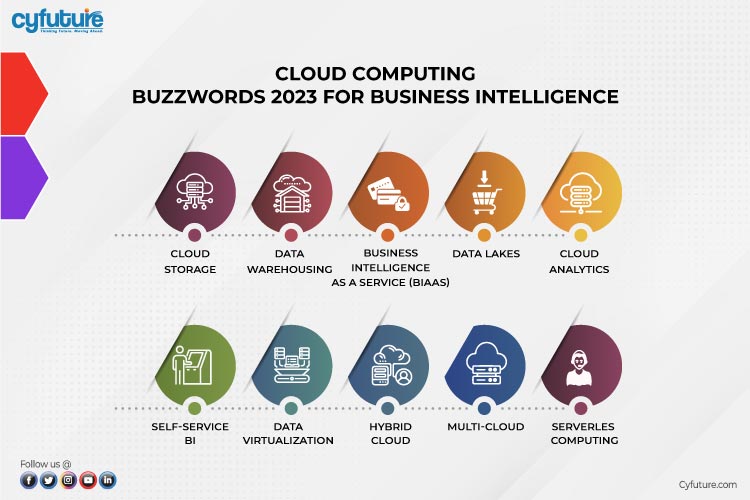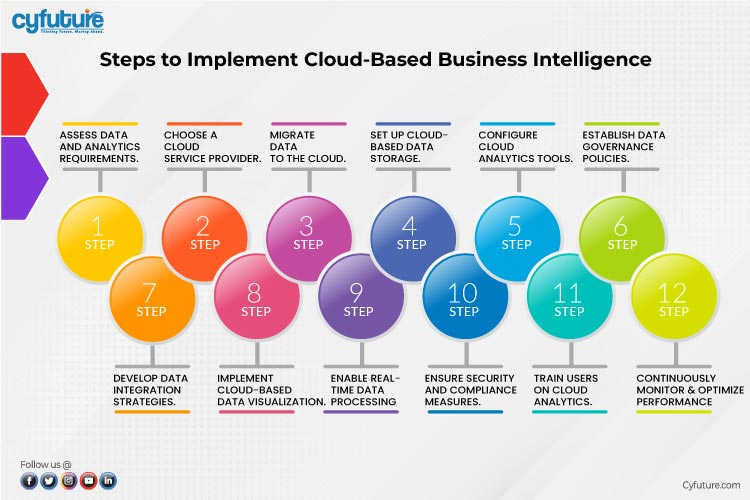-
Get Cloud GPU Server - Register Now!
Toggle navigation

The seamless integration of advanced technologies, vast data storage capabilities, and unparalleled accessibility has propelled cloud computing services to the forefront of technological innovation. Defined as the delivery of computing services, including storage, databases, software, and analytics, over the internet, cloud computing services have become the backbone of modern business intelligence.
Business intelligence plays a pivotal role in enabling organizations to extract meaningful insights from vast volumes of data, empowering them to make informed decisions and gain a competitive edge. By leveraging sophisticated tools and techniques, business intelligence helps identify patterns, trends, and correlations, unlocking valuable information that drives strategic planning and operational efficiency.
The impact of cloud computing services on business intelligence has been transformative. With cloud-based platforms, businesses can now store, process, and analyze massive datasets in a cost-effective and scalable manner. According to recent statistics, the global cloud computing market is projected to reach a staggering $623.3 billion by 2023, with a compound annual growth rate of 18%. This exponential growth underscores the increasing reliance on cloud computing services for driving business intelligence initiatives.
To gain deeper insights into how cloud computing services are revolutionizing business intelligence and enabling organizations to harness the power of data-driven decision-making, continue reading. Explore the remarkable ways in which cloud computing services are reshaping the business landscape and propelling organizations toward unparalleled success.

In the realm of business intelligence, cloud computing services have shattered the limitations of traditional data storage, ushering in an era of enhanced accessibility and unparalleled scalability. Through cloud-based data storage solutions, businesses can now break free from the shackles of physical hardware and embrace a digital ecosystem that offers exceptional advantages.
Cloud computing services provide a robust and secure infrastructure for storing vast volumes of data. The ability to scale resources up or down dynamically ensures that businesses can adapt to the ever-growing demands of data storage. According to industry reports, 94% of businesses witnessed an improvement in security after adopting cloud services, while 91% experienced a significant reduction in operating costs. These statistics highlight the tangible benefits of cloud-based storage solutions for organizations of all sizes.
The beauty of cloud computing services lies in their inherent flexibility. Organizations can seamlessly expand their data storage capacity without the need for substantial investments in additional infrastructure. This agility empowers businesses to respond rapidly to changing market dynamics, ensuring that their business intelligence initiatives remain at the cutting edge.
Moreover, cloud computing services have revolutionized accessibility for remote teams. With data stored securely in the cloud, geographically dispersed employees can collaborate effortlessly, accessing real-time insights from anywhere in the world. This enhanced connectivity and mobility foster innovation and enable businesses to make informed decisions swiftly.
Cloud computing services have not only revolutionized data storage but have also unleashed the full potential of advanced data analytics and insights. By harnessing the power of cloud-based analytics platforms, businesses can extract valuable information from their data and gain a competitive edge in the market.
Cloud computing services offer businesses access to sophisticated data analytics tools that were once reserved for large enterprises with hefty budgets. These platforms enable organizations to process and analyze vast datasets with remarkable speed and precision. In fact, studies show that cloud-based analytics solutions can deliver a 3.2 times reduction in time to insights compared to on-premises solutions, ensuring that businesses can make informed decisions swiftly.
Furthermore, cloud computing services seamlessly integrate machine learning and artificial intelligence (AI) algorithms into the fabric of business intelligence. These cutting-edge technologies enhance data analysis capabilities, uncovering hidden patterns and correlations that human analysis might overlook. By embracing AI-powered analytics, businesses can gain a deeper understanding of customer behavior, optimize operational processes, and identify emerging market trends.
One of the key advantages of cloud computing services in data analytics is the ability to process and analyze data in real time. By leveraging the scalability and computing power of the cloud, businesses can make decisions based on up-to-the-minute insights, enabling them to respond rapidly to changing market conditions. Real-time data processing and analysis empower organizations to seize opportunities swiftly, optimize performance, and stay ahead of the competition.

Cloud computing services not only revolutionize business intelligence with enhanced storage and analytics capabilities but also offer a remarkable opportunity for cost efficiency and resource optimization. By leveraging the power of the cloud, businesses can eliminate upfront infrastructure costs, embrace flexible pricing models, and optimize resource allocation like never before.
Traditionally, setting up on-premises infrastructure for data storage and analytics required significant upfront investments in hardware, software, and maintenance. However, cloud computing services eliminate the need for such expenses. With the cloud, businesses can leverage a virtual infrastructure that is maintained by the service provider, saving substantial costs associated with physical infrastructure setup.
Cloud computing services introduce pay-as-you-go pricing models, allowing businesses to pay only for the resources they use. This cost-effective approach ensures that organizations have the flexibility to scale their resources up or down based on their needs. Research indicates that organizations using cloud services can reduce their IT infrastructure costs by up to 30%.
Moreover, cloud computing services enable businesses to optimize resource allocation and utilization. The cloud offers the ability to dynamically allocate resources based on demand, ensuring that businesses are using their resources efficiently. By scaling resources automatically, organizations can avoid overprovisioning and underutilization, resulting in significant cost savings.
Security and data governance are of paramount importance. Cloud computing services offer robust and sophisticated measures to ensure the confidentiality, integrity, and availability of data, providing businesses with peace of mind in an increasingly interconnected world.
Cloud computing services employ state-of-the-art security measures and protocols to safeguard data. These measures include multi-factor authentication, encryption, and continuous monitoring to detect and mitigate potential threats. In fact, studies show that 94% of businesses experienced improved security after moving their data to the cloud, with 91% witnessing a reduction in security incidents.
Data encryption plays a critical role in protecting sensitive information stored in the cloud. Cloud computing services use advanced encryption algorithms to secure data at rest and in transit, ensuring that only authorized parties can access and interpret the data. This level of encryption offers an additional layer of protection, mitigating the risk of data breaches.
Furthermore, cloud computing services comply with stringent data protection regulations, such as the General Data Protection Regulation (GDPR) and the California Consumer Privacy Act (CCPA). These regulations enforce data privacy and governance standards, ensuring that businesses adhere to best practices when it comes to handling and processing personal and sensitive data. By leveraging cloud services, organizations can ensure compliance with these regulations, avoiding potential legal and financial repercussions.
Cloud computing services have emerged as a game-changer in the realm of business intelligence, revolutionizing the way organizations store, analyze, and leverage data. The future prospects and trends in cloud-based business intelligence are incredibly promising, with continuous advancements in technology and an increasing reliance on data-driven decision-making.
The integration of emerging technologies, such as machine learning and artificial intelligence, will further enhance the capabilities of cloud-based business intelligence, enabling organizations to extract deeper insights and make more accurate predictions. The growing adoption of edge computing, which brings data processing closer to the source, will also contribute to faster analysis and real-time decision-making.
Embracing cloud computing services is crucial for organizations seeking sustainable growth and a competitive edge in the digital landscape. The cost efficiency, scalability, and flexibility offered by the cloud enable businesses to optimize resources, reduce infrastructure costs, and allocate budgets effectively. The enhanced data storage, advanced analytics, and robust security measures provided by cloud computing services empower organizations to make informed decisions, drive innovation, and stay ahead in the market.
To thrive in the era of data-driven decision-making, it is imperative for businesses to embrace cloud computing services and leverage the power of business intelligence. By capitalizing on the remarkable capabilities of the cloud, organizations can unlock the true potential of their data, gain valuable insights, and position themselves for success in an increasingly competitive business landscape.
As cloud computing services continue to evolve and shape the future of business intelligence, those who seize the opportunities presented by this transformative technology will undoubtedly flourish, achieving unprecedented growth and reaping the rewards of a data-centric world.